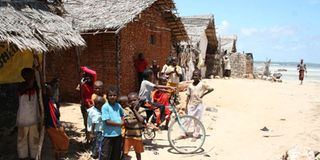Lamu residents plead with government to reopen Kenya-Somalia border

Children at Ras Kamboni, a town on the Somalia-Kenya border. Deaths among infants and pregnant women are high following the closure of the border. Many residents used to get antenatal services and vaccinations at Kiunga Hospital in Kenya.
What you need to know:
- The ban by the government in June 2019, was meant to prevent terrorism and illegal trade.
- Traders said the reasons given by the government for closing the border are flimsy.
The ban on cross-border activities between Kenya and Somalia is hurting socio-economic activities in Lamu.
The ban by the government in June 2019, was meant to prevent terrorism and illegal trade.
For decades, communities from the two sides of the border have co-existed for a myriad of reasons, ranging from trade, medical services and social events like marriages.
Residents of border areas like Kiunga and Ishakani in Lamu county in Kenya and those in Ras Kamboni, Kismayu and Mogadishu in Somalia have even intermarried.
Families used to visit each other freely — until the ban.
Mr Mohamed Aboud, a resident of Ishakani village, admitted the border closure has greatly disrupted social and economic activities.
Mr Aboud, whose wife comes from Ras Kamboni, said he has not visited his relatives in the neighbouring country for a year.
“Our in-laws are in Somalia. Our sisters and daughters are also married there. The border closure came as a shock as we can no longer visit one another.
“We don’t know the fate of our relatives and friends in Ras Kamboni,” Mr Aboud told the Nation on Monday.
Scuttled wedding
Ms Nazma Ali,24, said the border closure scuttled her wedding. “I lost my would-be husband, a man from Kismayu in Somalia,” she said.
Ms Nazma said the wedding preparations had taken almost six months and were in their final stages when the government announced the border closure.
“We proceeded with the wedding preparations, but could not cross to Somalia. They were to visit my family and pay the bride price, but that did not happen,” she said.
“I lost the man who would be my husband. We had known each other since childhood. He lost his attention on me. It’s very painful because we no longer communicate.”
Mr Ahmed Fumo, a resident of Kiunga, said the decision to shut the border was ill-advised since locals were not consulted.
Mr Fumo added that the blanket ban on cross-border activities is unwarranted.
Cross-border trade
“One should not just wake up one day and declare the border closed. A lot of things need to be put into consideration before such an action. Families have been destroyed. The decision was unnecessary,” he said.
For decades, children and pregnant women from Ras Kamboni and other Somalia regions crossed into Kenya to be treated at Kiunga Hospital. They also received vaccinations and pre-natal services.
Border residents also attended free medical camps organised by Kenya Defence Forces.
Ms Habona Abdi, a Ras Kamboni resident, said life has been rough in the past one year.
She said the decision by Kenyan authorities has hit women and children hard.
“We’ve missed out on pre-natal services and vaccines as Ras Kamboni does not have a hospital. Kiunga Hospital was our only hope. The women and their babies have been left to their own devices. They are dying,” she said.
“We plead with the Kenyan government to open the border. Our families are being exploited by witchdoctors and herbalists.”
Mr Suleiman Ali, another Kiunga resident, said the decision by Kenyan authorities could lead to unnecessary disputes.
“Why should the border be closed to civilian activities? There is no cross-border trade. People in the two countries have always had strong links,” Mr Ali said.
Traders said the reasons given by the government for closing the border are flimsy.
Those interviewed said the business community should not be condemned for human, drug and arms trafficking.
They said the government has machinery and personnel to stop such activities without necessarily resorting to closing the border.
Mr Ali Salim, the traders’ spokesman, said businesspeople are ready to be vetted by State functionaries if that is what would lead to the reopening of the border.
“The government should not say it shut the border to stop illegal trade. If officials have any other reason, let them tell us the truth. What is happening is unfair. Businesses have collapsed. The government should know that we are ready to be vetted,” he said.





